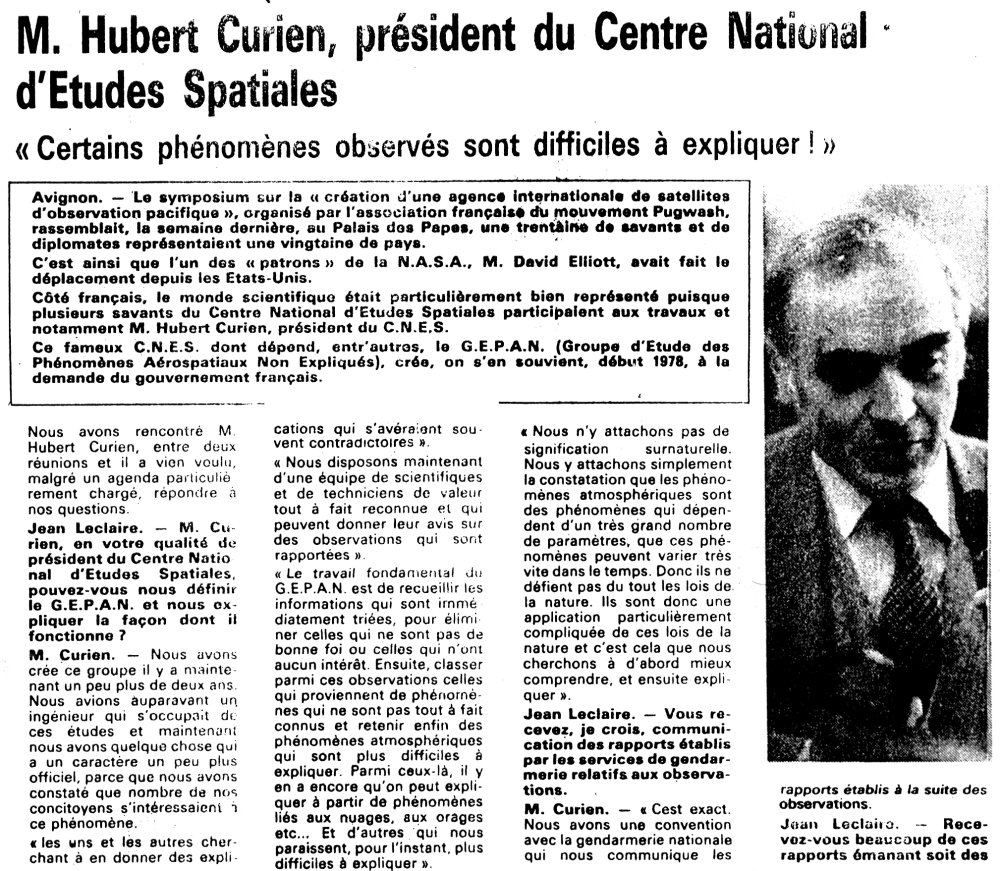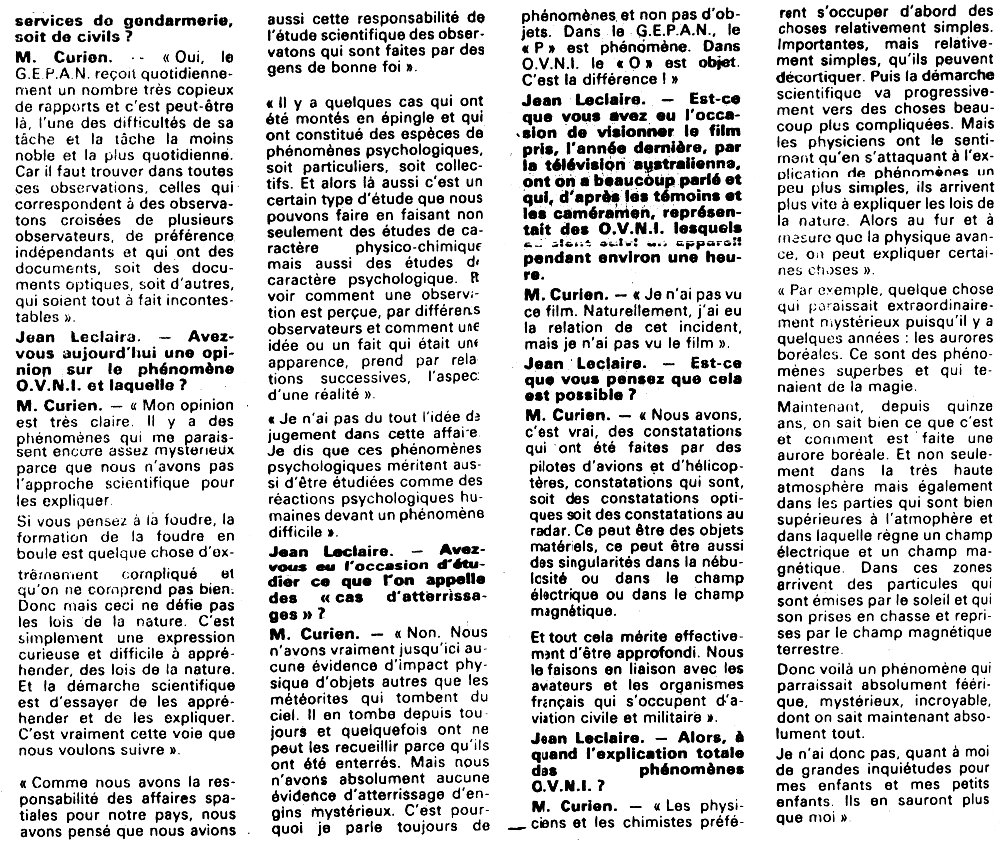The article below was published in the daily newspaper Vaucluse - Matin, France, page 5, le 23 avril 1980.

|
A column animated
by Jean Leclaire
"Some observed phenomena are difficult to explain!"
Avignon. -- The symposium on the "creation of an international agency of scientific observation satellites", organized by the French association of the Pugwash movement, brought together, last week, at the Palais des Papes, around thirty scholars and diplomats representing around twenty countries.
This is how one of the "bosses" of N.A.S.A., Mr. David Elliot, made the trip from the United States.
On the French side, the scientific world was particularly well represented since several scientists from the Centre National d'Etudes Spatiales took part in the works, in particular Mr. Hubert Curien, president of the C.N.E.S.
This famous C.N.E.S. on which depends, among other things, the G.E.P.A.N (Groupe d'Etude des Phénomènes Aérospatiaux Non Expliqués) [sic], created, as we remember, in early 1978, at the request of the French government.
We met Mr. Hubert Curien, between two meetings, and he was kind enough, despite a particularly busy schedule, to answer our questions.
Jean Leclaire. -- Mr. Curien, in your capacity as President of the C.N.E.S, can you define the G.E.P.A.N. and tell us how it works?
Mr. Curien. -- We created this group a little over two years ago. We used to have an engineer who took care of these studies and now we have something that is a little more official, because we have noticed that many of our fellow citizens are interested in this phenomenon.
"Many are trying to give explanations that often turned out to be contradictory."
"We now have a team of highly recognized scientists and technicians who can comment on reported sightings."
"The fundamental work of the G.E.P.A.N. is to collect information which is immediately sorted to eliminate those which are not in good faith or those which have no interest. Then, to classify among these observations those which come from phenomena which are not completely known and finally to retain atmospheric phenomena which are more difficult to explain for now, more difficult to explain."
"We do not attach any supernatural significance to it. We simply attach to it the observation that atmospheric phenomena are phenomena which depend on a very large number of parameters, that these phenomena can vary very quickly over time. Therefore, they do not defy the laws of nature at all. They are therefore a particularly complicated application of these laws of nature and that is what we seek to first understand better, and then to explain".
Jean Leclaire. -- You receive, I believe, communication of the reports drawn up by the gendarmerie services relating to the observations.
Mr. Curien. -- "That is correct. We have an agreement with the national gendarmerie which communicates to us the reports established following the observations.
Jean Leclaire. -- Do you receive many of these reports from either

|
gendarmerie services, or civilians?
Mr. Curien. -- "Yes, the G.E.P.A.N. receives a very copious number of reports on a daily basis and this is perhaps one of the difficulties of its task and the least noble and most daily task. Because it is necessary to find in all these observations, those which correspond to cross-observations of several observers, preferably independent and which have documents, either optical documents, or others, which are completely indisputable."
Jean Leclaire. -- Do you have an opinion today about the U.F.Os and which is it?
Mr. Curien. -- "My opinion is very clear. There are phenomena that still seem quite mysterious to me because we don't have the scientific approach to explain them."
"If you think about lightning, the formation of ball lightning is extremely complicated and not well understood. So but this does not defy the laws of nature."
"As we have the responsibility for space affairs for our country, we thought that we also had this responsibility for the scientific study of observations that are made by people in good faith".
"There are a few cases which have been highlighted and which have constituted kinds of psychological phenomena, either particular or collective. And so here too it is a certain type of study that we can do by carrying out not only studies of the physico-chemical character but also studies of the psychological character. And to see how an observation is perceived, by different observers, and how an idea or a fact which was an appearance, takes on the appearance of a reality by successive reporting".
"I have no idea of judgment in this matter at all. I say that these psychological phenomena also deserve to be studied as psychological and human reactions to a difficult phenomenon."
Jean Leclaire. -- Did you have the opportunity to study what are called "landing cases"?
Mr. Curien. -- "No. We really have no evidence so far of physical impact of objects other than meteorites falling from the sky. They have always been falling and sometimes we cannot collect them because they have been buried. But we have absolutely no evidence of the landing of mysterious craft. That is why I always speak of phenomena and not of objects. In the G.E.P.A.N the "P" is for phenomenon. in U.F.O. th "O" is for object. That's the difference!"
Jean Leclaire. -- Did you have the opportunity to view the film taken last year by Australian television, which was much talked about and which, according to witnesses and cameramen, represented U.F.Os which had followed a plane for about an hour.
Mr. Curien. -- I have not seen this film. Naturally, I had the report of this incident, but I did not see the film."
Jean Leclaire. -- Do you think this is possibleP
Mr. Curien. -- We have, it is true, observations which have been made by airplane and helicopter pilots, observations which are either optical observations or radar observations. It can be material objects, it can also be singularities in the nebulosity or in the electric field or in the magnetic field.
And all of this is indeed worth exploring. We do this in liaison with French airmen and organizations dealing with civil and military aviation."
Jean Leclaire. -- So, when will we get the total explanation of the U.F.O. phenomena?
Mr. Curien. -- Physicists and chemists prefer to deal with relatively simple things first. Important but relatively simple, which they can dissect. Then the scientific approach gradually moves towards much more complicated things. But physicists have the feeling that by tackling the explanation of slightly simpler phenomena, they are able to explain the laws of nature more quickly. So as physics progresses, we can explain certain things."
"For example something that seemed extraordinarily mysterious since [sic] a few years ago: the aurora borealis. They are superb phenomena and something like magic."
"Now, for fifteen years, we have known what it is and how the aurora borealis is made. And not only in the very upper atmosphere but also in the parts which are much higher than the atmosphere and in which there is an electric field and a magnetic field. In these areas arrive particles which are emitted by the sun and which are chased and taken up by the Earth's magnetic field.
So here is a phenomenon that seemed absolutely magical, mysterious, incredible, of which we now know absolutely everything.
I don't have any great concerns for my children and my grandchildren. They will know more than I know."